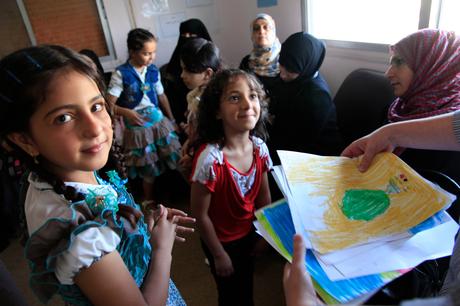
Syrian refugee children.
Since 2011, Syria has been embroiled in a civil war. Millions of people have been displaced — the majority of whom have fled to Jordan and Lebanon — and over 220,000 have been killed so far, according to the organization Mercy Corps.
Like other conflicts, this violence has uniquely impacted women — a reality that the International Rescue Committee recognized and specifically studied. Their examination of Syrian, female refugees’ experiences was published in a 2014 report, which notes that of the 3 million Syrians who have fled for Lebanon, Jordan, Iraq or Turkey, 4 out of 5 are women or children. 60% of women surveyed expressed feelings of insecurity and 1 in 3 women said they were too scared or overwhelmed to leave home at all.
But the report goes beyond statistics, and also examines the stories of Syrian women, reporting how they are demeaned and disrespected in the places they reside but can’t fully call home. For example, we are introduced to women like Farah, a 36-year old currently located in a refugee camp in Jordan, who describes the harassment she faces daily:
“When I walk down the street I hear the comments men make. When I take public transportation to pickup aid or do the shopping, men always ask me if I am Syrian. I feel immediately objectified. In Syria, I would go out at night, even without a male escort … but here, I isolate myself … Even in my own home, I can’t escape the harassment—I am afraid when I am inside with the door locked. Strange men call my cell phone, trying to engage me in conversation or solicit me. The result is incredible daily stress and growing depression. I feel like I am choking.”
Ultimately, this report importantly sheds light not only on the broad scope of this problem, but how these events have forever altered these women’s very identities. Their nationality, the place they can call home, is gone forever. The abject poverty refugees generally experience forces women — who are often considered doubly subordinate based on their gender — into the lowest classes of their new countries and furthermore subjects them to violent treatment. This is the reality of the Syrian female refugee: They are far too often stripped of their identities, reduced to the lowest socioeconomic standards, and, inevitably, are objectified.
These women deserve to be heard, and the International Rescue Committee is encouraging people to do just that with their #AreWeListening campaign. To learn more, visit their website — and choose to listen.

